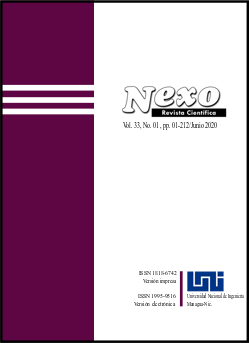Legal framework analysis of distributed generation in Latin America and Nicaragua, to incorporation of smart metter devices.
DOI:
https://doi.org/10.5377/nexo.v33i01.10045Keywords:
Distributed Generation, Savings, Renewable Energy, Electric Power Systems, Legal and regulatory frameworkAbstract
Distributed generation is an alternative for the production of electrical energy in many countries. This makes it possible for electrical power systems to have renewable electrical energy available, coming from homes at times when there is a peak of consumption in a country's electrical power system. One of the most important aspects that prevents its incorporation into the Nicaraguan electric power system is the legal and regulatory framework. This maintains a sustained dependence on the consumption of fossil fuels as the main source of energy, contributing to the generation of greenhouse gases, and to an excessive expenditure of economic resources. In the recent period (2016-2018), distributed generation is managed by a small sector of the population, small and large companies, as an element to generate savings and cover between 50% and 60% of the cost of business operations. This is because the generation distributed for the Legal and Regulatory Framework of Nicaragua is to generate energy in homes and companies for self-consumption. Distributed generation is an opportunity to inject excess energy produced in homes into the grid, to dispose of energy from renewable sources. That contributes to the production of greenhouse gases and an excessive expenditure of money that also rises the Price of electric power service. Currently, distributed generation is considered as an element to generate savings and cover between 50% to 60% of the cost of operations to small and big business. This is because the distributed generation for the legal framework of Nicaragua, is not to generate and inject energy from homes and business to the power system (SIN), but for self-consumption. Discover that to inject energy from home devices, that was because a need of having a greater amount of energy and the availability of technology.
Downloads
2260
Downloads
Published
How to Cite
Issue
Section
License
The authors who publish in Nexo Scientific Journal agree to the following terms:
- Authors retain the copyright and grant the journal the right of the first publication under the license Creative Commons Attribution License, which allows others to share the work with a recognition of the authorship of the work and the initial publication in Nexo Scientific Journal.
- Authors may separately establish additional agreements for the non-exclusive distribution of the version of the work published in the journal (for example, in an institutional repository or a book), with the recognition of the initial publication in Nexo Scientific Journal.
- Authors are allowed and encouraged to disseminate their works electronically (for example, in institutional repositories or in their own website) before and during the submission process, as it can lead to productive exchanges, as well as earlier and greater citation of published works.










